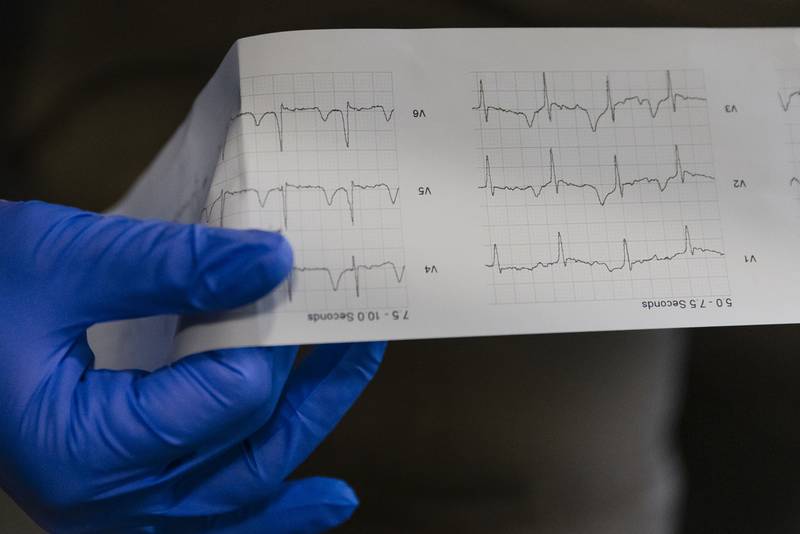Congenital disorders
Young mother recovers from heart attack after hidden cardiac problem
A sudden heart attack in a fit and healthy 30-year-old mother while driving home from the Atlantis water park in Dubai has exposed the fragility of life for those living with an undiagnosed cardiac condition.
Shahil Khan, from India, a mother of two young children, was enjoying a relaxing family break at the luxury hotel and water park during the Eid holiday in April.
After feeling unwell and fainting earlier in the day, she later collapsed when her husband was driving her to the hospital for a check-up.
If there is any history of earlier risk factors in the family, a relative has died suddenly or suffered a heart attack, then we recommend screening as early as 20
Dr Brajesh Mittal, cardiologist at Medcare Hospitals and Medical Centres
Quick-thinking medics resuscitated Ms Khan and delivered an electric shock using a defibrillator to restart her heart at Aster Hospital in Sharjah.
Doctors are highlighting the case to show the risks of undiagnosed heart problems in young people, ahead of World Heart Day on Friday.
Ms Khan, who exercised regularly and had no other health complaints, was diagnosed with a heart muscle abnormality known as arrhythmogenic right ventricular disease (ARVD).
“Everything was fine until breakfast in the morning,” said Ms Khan, who had given birth four months earlier.
“I was with my family and my husband, two kids and their grandmother also, my brother-in-law and his wife.
“After we had three hours at the water park, I was absolutely fine, and went on feeding the baby.
“When we reached the hotel lobby, just 50 metres away, I fainted.”
Paramedics who treated Ms Khan ran routine blood-sugar tests and checked her heart rate, but found nothing of concern.
But later that day, However, her condition deteriorated rapidly.
“I said let’s do a doctor visit on the way home,” said her husband, Naiyer Alam, a metal trader from India who lives in Ajman.
“I could see she was not feeling well. She was sitting next to me and then suddenly collapsed.”
Life-saving care
Luckily, they were close to the hospital so Ms Khan was immediately admitted to the emergency room.
Under-recognised structural heart disorders are common causes for sudden cardiac death in young people.
Early identification and treatment, coupled with a healthy diet and lifestyle can help avoid catastrophic complications.
“Shahil was very fortunate she was near a hospital when this happened,” said Dr Yogeeswari Vellore Satyanarayanan, a specialist cardiologist at Aster Hospital, Sharjah.
“When she reached the emergency room, she was in a state of cardiac arrest, with no pulse or blood pressure.
“We started her off with the chest compressions and then we had to shock her twice with the defibrillator. Eventually we got a pulse.”
ARVD is one of the under-recognised causes of sudden cardiac death where the right, and in some cases left side of the heart, muscle gets weaker, becoming prone to abnormal heart rhythms
Patients are fitted with an automatic implantable cardioverter defibrillator to protect against sudden cardiac death in the future.
Since her AICD was fitted, Ms Khan is recovering well, although she has been advised to avoid intensive exercise, and is taking some medications.
“Until they deteriorate, it’s very difficult to pick up these kind of conditions,” Dr Satyanarayanan said.
“Sometimes they have palpitation or dizziness, but this can be many things.
“Sudden cardiac death in the young is rising and it’s of alarming concern.
“Structural heart diseases generally don’t come into the picture unless there is a family history.
“We do treat a lot of expats, predominantly in the South-East Asian population.
“They tend to have a drastic age shift. We usually see it in the late thirties and early forties, but what we see here is late twenties and early thirties, which is very alarming.”
How to spot undiagnosed conditions
Early signs of heart problems can include palpitations, dizziness, a shortness of breath and chest discomfort or tightness or jaw pain on exertion, as well as feeling light headed.
Dr Sandeep Golchha, a cardiologist at NMC Speciality Hospital Al Nahda, Dubai, said undiagnosed heart problems are becoming more common in younger people.
“In our clinical practice, many times we encounter patients in their thirties and forties presenting with chest pain,” he said.
“Regular health check-ups with blood pressure measurements and lab tests for blood glucose and lipid levels should be done periodically for early detection and management of these conditions.”
At Cleveland Clinic Abu Dhabi, half of all major heart attacks reported in the past three years occurred in people under the age of 50.
While there is no single answer as to why cardiac issues are affecting younger people in the UAE, studies suggest genetics, lifestyle changes, dietary habits and stress are likely risk factors.
“The most common heart conditions in young people are congenital diseases,” said Dr Rayyan Algordy, a cardiologist at Prime Medical Centre in Al Nahda.
“But with the abundance of technology, along with a sedentary lifestyle, we have seen a recurrence of common heart diseases in young people.”
Cardiovascular disease is a leading cause of mortality worldwide and contributes to 40 per cent of all deaths in the UAE
Treatment often depends on the kind of disease and severity of symptoms.
“Heart disease is a combination of so many adverse factors,” said Dr Brajesh Mittal, an interventional cardiologist at Medcare Hospitals and Medical Centres.
“If there is any history of earlier risk factors in the family, of high blood pressure or a relative has died suddenly or suffered a heart attack, then we recommend screening as early as 20.”
Updated: September 28, 2023, 3:30 AM

